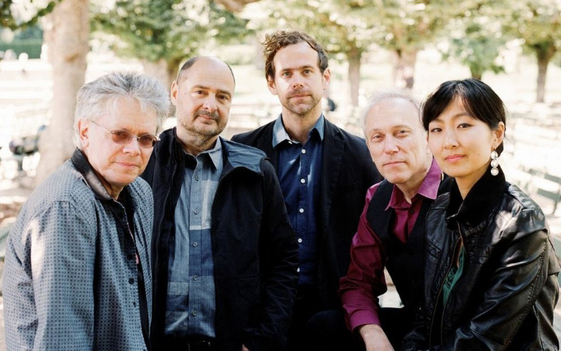Bryce Dessner Shares “Aheym” with Kronos Quartet
The musical life of Bryce Dessner is nothing short of a balancing act. Most notably, he’s the guitarist in The National, alongside his twin brother Aaron. But he’s also a Yale School of Music grad who composes classical pieces, co-founded the Brassland record label, co-produced the acclaimed AIDS-benefitting compilation Dark Was the Night, collaborated with Sufjan Stevens, Nico Muhly, Antony Hegarty, proclaimed himself a Deadhead and is generally known as an all-around good guy. On Nov. 5, Anti- released his collaboration with legendary string ensemble Kronos Quartet. The title piece, “Aheym,” (Yiddish for ‘homeward’) is a jarring and intense ode to his grandmother’s journey across Eastern Europe to New York City.
Relix spoke to Dessner about his latest collaboration, his Jewish grandparents and The National’s much buzzed-about indie rock tribute to the Grateful Dead, Dead Hot.
Releasing an album of string compositions is obviously a bit different than releasing a rock’n’roll album. How did the lead up to Nov. 5 compare to how you feel when releasing a National record?
The National being a bigger rock band, the machinery behind releasing albums is much, much larger. The emphasis with a rock record is the immediacy – getting the most impressions right away. But this is music I hope people listen to – and perform – a long time from now. It’s not about radio play.
Can you tell me how you hooked up with Kronos Quartet in the first place?
If you’re in the world of contemporary classical music, Kronos Quartet is like a grand old punk band. They stand out as the seminal band. How the younger generation defines themselves is all based on Kronos. The National has a huge debt to, say, R.E.M. In classical music, it’s Kronos.
When my brother and I produced [2009’s] Dark Was The Night, we really wanted Kronos to be on it. It was opening a window from within our world. They push boundaries of what string instruments can do, so including them on that record was important.
Shortly after that, David [Harrington, of Kronos] saw a kindred spirit in me, and asked me to write them a piece for a big concert. They didn’t want a starter piece – this was for the [Naumberg Bandshell] in Central Park. “Aheym” is what I wrote for that show.
How do you approach composing differently than you approach writing music with The National?
I’m definitely the same person – it’s just me in two different rooms. It’s important to know that I don’t put on my classical hat and get out my master’s degree. But in The National, we really prioritize the song. No matter how experimental the music is, or how crazy the guitar is, if the song isn’t well served, then it doesn’t matter. With instrumental music, you can delve much deeper into certain colors and rhythms that might not service a rock song, but become more primary information for a string quartet.
I like to put the simple economy of rock music in motion in classical: it has to be interesting in every moment. It can be tempting to allow yourself to endlessly meander, but I try not to.
“Aheym” is based on your grandmother’s journey to Brooklyn from Eastern Europe. Jewish grandparents are truly unique and wonderful people. Can you tell me about yours?
My grandfather descended from Romanian Jews and was born here, but my grandmother was born in Odessa. She lived through Russian revolution. The [anti-communist] White Army really did burn her town down, and she remembered [communist] The Red Army being much nicer.
Her uncle was a violinist, famous in his community. He arranged for them to get out of Russia through Poland, where she spent a few years before coming to New York. Her stories are amazing. She slept on a fire escape her first summer in America.
The actual details of the journey were very frantic. And so “Aheym” is a piece about flight – it’s frantic, constantly moving.
Yiddish today is all but a dead language. What does that say to you about the legacy of people like your grandparents? Is it important to you that we, at least within our own families, remember them?
I think so. My grandmother’s father was actually a reporter at the Yiddish daily in Brooklyn. History, within families especially, lives on in the memories of children. In America, people feel the need to internalize where they’re from, in their own personal way. I’ll always have this piece, and I’ll always think of my grandmother.
You’ve made your name as a great collaborator on a number of projects. Is there a dream project that you’d love to work on with other musicians?
We became friendly with Michael Stipe in the latter days of R.E.M. I think he’s amazing – we’d love to do something with him. And Patti Smith. She’s a mythic presence here in New York.
How far in development is Dead Hot? When will we hear some of this music?
We have the cast together and sessions scheduled for January. In the spring you’ll hear some music. We’re trying to be very collaborative. We want to embrace the culture of the Dead and really have people play together. We want to let things get long form and crazy. For now, we’re still exploring.




















